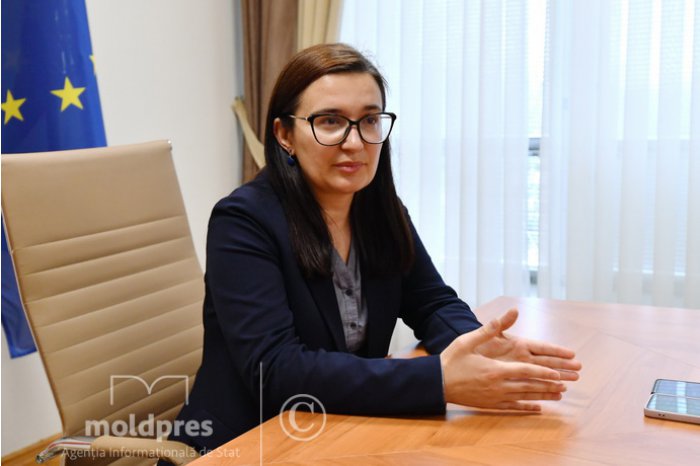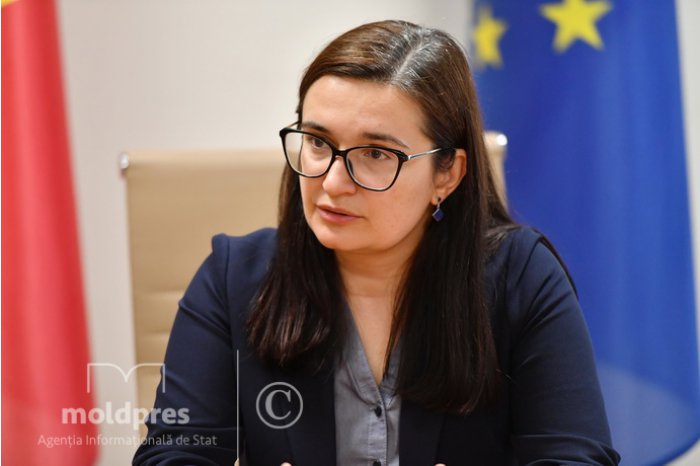Moldovan deputy PM says European integration not sprint, but marathon
16:28 | 23.12.2024 Category: Interview, Event
Chisinau, 23 December /MOLDPRES/ -
Interview given exclusively with the MOLDPRES Agency by Deputy Prime Minister for European Integration Cristina Gherasimov.
MOLDPRES: Mrs. Gherasimov, in December, you have paid several visits to Brussels, where you had an agenda full of events. Besides the eighth meeting of the Moldova-European Union Association Committee, you also participated in the bilateral screening on the Chapters 2, 3, 4 and 7. What do the latter regard?
Cristina Gherasimov: Indeed, we started the second group of chapters concerning the domestic market – Cluster 2. We have already managed to analyze the Chamber 2, which regards the free movement of workers, Chapter 3 – right to establishment and free circulation of services, Chamber 4 – free circulation of capital and Chapter 7 – right of intellectual property.
For Moldova, Chapter 2 means integration of the Moldovan labour market into the one of the European Union, so that any citizen of the country can freely work in any European country, without any discrimination.
The Chapter 3 deals with the free circulation of services, which means a great advantage for the states with small markets, such as Moldova. This means that our entrepreneurs and their companies will be able to freely provide services for 450 million citizens of EU. This means that they will have new opportunities, which will imply the creation of new jobs and the chance of new incomes for our economy.
Chapter 4 – free circulation of capital – this is another fundamental pillar of the European single market. This implies the development of a modern economy and more opportunities for investments, through the removing of all obstacles to the circulation of money and thus – the creation of a better environment for investors of Moldova and from abroad.
The last chapter which I discussed in Brussels this year was the Chapter 7 – which is related to the right of intellectual property. With the aligning with the European standards on this chapter, our citizens who work in the concerned sector will benefit from a better protection of their copyrights, patents, trademarks and other forms of intellectual property. This will lead to a better protection of works and innovations and will enhance the access to quality products and services for all consumers.
MOLDPRES: How much of this analysis process has been carried out and where we are now?
Cristina Gherasimov: The process of analyzing the legislation has two stages: the first one was the explanatory screening and the second, where we are now, is the bilateral screening.
The first stage took place between February and May. At that time, the civil servants from all our institutions went to Brussels, where we had an open dialogue with European Commission experts, who explained us in detail what the European legislation consists in. At the second phase, we also go to Brussels, but only this time, the colleagues of the European Commission can make a concrete and transparent picture about Moldova - which our laws are and to what extent we are adjusted to the European exigencies. But it is important that we emphasize: we, through this process, have, first of all, the goal to build a modern state which meets the expectations of our citizens, who want good governance and an efficient administration.
So, we are now at the stage of bilateral screening, which lasts between 12 and 15 months. We started in last July and meanwhile we have finished the first group of chapters from the Cluster 1, Fundamental Values. Now, we switched to the Cluster 2, which regards the domestic market. The clusters 3, 4, 5, 6 come next, which we will cover together till the next autumn.
MOLDPRES: What comes after the screening stage? How big and complicated the task of the authorities, of the governmental team is on the way to EU and when the negotiations themselves might start?
Cristina Gherasimov: As soon as a candidate state finishes the stage of bilateral screening for a group of chapters, just as we did in the group of chapters of the so-called cluster 1, a period comes, when the European Commission analyzes all information which we covered together and elaborates a screening report. This analytical report, which establishes how far we are from the EU’s legislation or, on the contrary, how close we are, is submitted to the EU Council. Afterwards, those 27 member states are to analyze this report and take a decision – is Moldova ready to open the negotiations themselves for the concerned group of chapters or not yet.
Simultaneously with this process, we continue the stage of screening for the next five clusters left. We switch to a parallel pace of work, the screening, as well as the elaboration of materials for the preparations of the positions of negotiations, in order to be ready to open the negotiations themselves for the cluster 1.
This is a huge volume of work for our institutions. I cannot but thank each colleague who makes this effort daily. These are people for whom there are no Saturdays, no Sundays and the holidays represent a luxury. We have a small administration and therefore big efforts are needed. Yet, also other countries of similar dimensions, such as Estonia, Latvia or Malta, passed through this volume of preparation for accession to the European Union. So, it is possible for Moldova as well. What we do now is to work with relevant institutions for one chapter or another. At the same time, yet, we involve in this work colleagues from the civil society, who have expertise, from the business environment and the academic ones, as well as colleagues from the Diaspora.
Each time when I go on working visits to Brussels, as well as to other countries, we meet our Moldovans from abroad and explain them at what stage we are – and we are happy that many of them express wish to help us. This is a joint effort and we invite the Diaspora people, who have time to join us, time and patience, in fact, given that the European integration is not a sprint, but a marathon.
MOLDPRES: One of the most important novelties of the last autumn was the plan on economic growth for Moldova, announced by European Commission President Ursula von der Leyen. Where the 1.8 billion euros will be used, in what sectors?
Cristina Gherasimov: This money is to be directed to the sectors which can help us speed up Moldova’s economic growth. For this, our teams from different ministries work on giving final touches to the reforms’ agenda, which will stay at the basis of the Plan and on identifying the projects of investments which will become the fundament of our economic growth. We are to build not only the new infrastructure or to modernize the current one, but also to create more jobs. We estimate to orient ourselves now to the creation, in the next years, of 100,000 jobs and to the backing of about 5,000 family businesses. Also, new businesses, as well as already existing businesses, capital investments in roads, bridges, railways.
MOLDPRES: You have been holding the office of European integration since February 2024 – a relatively short period, but full of events, which influenced the European integration way of Moldova. In your opinion, which were the biggest challenges, as well as achievements?
Cristina Gherasimov: We have many achievements and we even must be happy with them, as during a single year, we have managed to do a lot together. We enjoyed two historical moments. We managed to pass through the referendum well and the strategic objective which we want – Moldova’s accession to the European Union – is now contained in Moldova’s Constitution.
The second great achievement was the organization, in June, in Luxembourg, of the first intergovernmental Conference, which was the solemn moment through which the European Union formally opened the negotiations with Moldova. At the same time, in less than one year, we created an absolutely new institution – Bureau for European Integration at the State Chancellery. We have new, motivated, ambitious colleagues in our team.
We joined new European programmes, as a way of accelerating our integration into the European Union. I give you an example: our civil servants are able to be detached to the European Commission to learn how people work there. All these achievements have taken place in a relatively short period of time, as compared to the pace of other states candidates, which passed through the same stages.
It is important that we maintain the same pace in 2025 as well. For this, we need continuity, consensus and cooperation not only between the state’s institutions, but also between the three powers of the state, as well as quite close cooperation with the civil society, business and academic environments.
MOLDPRES: How Moldova is seen from abroad? How the European officials regard our country’s efforts of aligning with the European Union?
Cristina Gherasimov: We are regarded as a model candidate state, from which also other countries can learn. It is important that we preserve the determination to transform our society, to bring the European standards home, so that our citizens can enjoy all benefits of the European Union. This process started four year ago, when Mrs. President Maia Sandu opened the doors for Moldova in absolutely all member states, as well as in the European institutions. Mrs. President has recently paid a visit to Brussels, where she reaffirmed our country’s firm commitment to move further, to reform also in the most complicated sectors, such as the justice. Bu I would not focus on visits, but on our determination. Surely, a few candidate states manage to do what we do.
MOLDPRES: The Moldovan authorities have set the goal of Moldova’s accession to EU till 2030. If you regard this deadline from the perspective of the present days, is it real, realizable?
Cristina Gherasimov: The deadline of 2030 is the one which we set inside the country, in order to be ready for accession to the European Union. This deadline allows us mobilizing the efforts and institutions in such a way, in order to know exactly what we have to do and to manage to carry out all transformations. Although many people used to say from the first days that it was impossible, we proved that it is possible, through everything which we have done starting from 2022 till present. With this motto – that impossible is possible – we live and work every day. And step by step, we manage, in continuation, to turn the impossible into possible. Who would have believed, in 2021, for instance, that we would be state candidate in 2022?
MOLDPRES: Mrs. Deputy Prime Minister, thank you.



